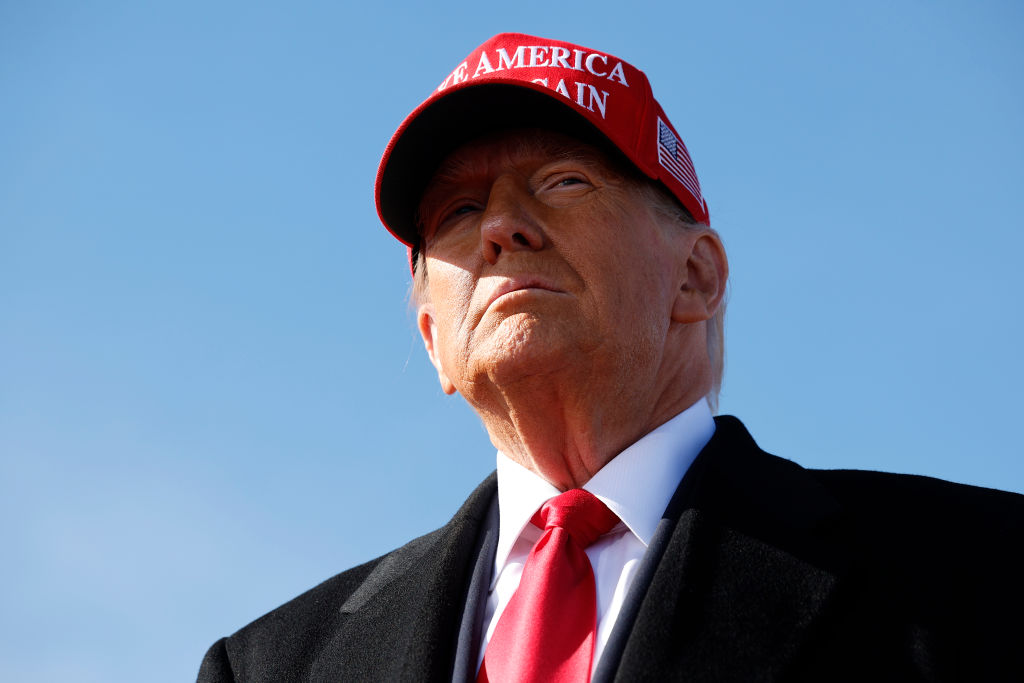Trump’s Houthi Bombing Halt Puts America First
The president’s surprise move will save lives and advance U.S. interests.

President Donald Trump made a bold move Wednesday, announcing an immediate halt to U.S. bombing of Yemen’s Houthi rebels in exchange for their commitment to stop attacking ships in the Red Sea. “They said, at least to us, that they don’t want to fight anymore,” Trump revealed during an Oval Office meeting with Canada’s Prime Minister Mark Carney. “We will honor that, we will stop the bombings, as they said they won’t be blowing ships anymore.”
There are significant questions surrounding the announcement: Trump simply said that the Houthis won’t be blowing “ships,” without specifying whether he referred specifically to American ships or any ships. His words that “the Houthis said that, at least to us” may hint that it is specifically the American ships he was referring to. Remarkably, Trump did not in any way appear to be linking his decision to a Houthi commitment to stop attacking Israel. In fact, the Israeli leadership seems to have been caught completely off-guard by Trump’s announcement.
It becomes even more intriguing given the announcement of the Omani Foreign Minister Badr Albusaidi about the mediating role the sultanate played between the Houthis and the U.S. Oman, of course, is also the main facilitator of the U.S. talks with Iran, the Houthis’ chief backer, having hosted the first round of talks between Trump’s special envoy Steve Witkoff and Iran’s Foreign Minister Abbas Araghchi. Not surprisingly, Witkoff is reported to have been involved in hammering out the deal with the Houthis through Oman.
The Houthi attacks on U.S. ships were a major stumbling block in the nascent Washington-Tehran dialogue, as White House statements have made clear. Last week, Secretary of Defense Pete Hegseth, in an aggressive post on X, warned Iran that it will “pay the consequence” of its support for the Yemeni group “at a time and place of our choosing.”
Trump’s decision, if it holds, deserves praise for two reasons. First, it reflects a pragmatic recognition that the escalating U.S. military campaign was spiraling into a violent dead end, with significant civilian casualties, no clear strategic gains, and mounting damage to its own administration.
The U.S. campaign against the Houthis, which intensified in March, was meant to deter their attacks on Red Sea shipping. But the campaign, involving large-scale strikes on Houthi leadership, infrastructure, and munitions, yielded grim results amid limited operational success. A U.S. strike on a migrant center in late April killed 68 people, mostly women and children, according to Houthi media, drawing widespread condemnation. Over the past five weeks, scores of civilians perished, with Houthi-run health authorities reporting 31 killed and 101 injured in a single day. Sana’a residents described nightmarish scenes of explosions shaking neighborhoods and terrorizing families.
Despite the onslaught, the Houthis continued disrupting Red Sea shipping and showed no signs of backing down, even intensifying attacks on Israel and U.S. warships. Back in America, the war on Yemen played a role in undermining Trump’s own administration through the “Signalgate” scandal.
Trump’s decision to halt the bombing acknowledges the reality: This was a bloody cul-de-sac with no gain of any sort in sight.
Second, the decision clears a potential pathway to negotiations with Iran. While Houthis cannot be accurately described as Iran’s “proxy,” as they are often labelled, Tehran is their main benefactor, providing them weapons, training, and intelligence. Trump’s decision to halt the bombing bolsters ongoing U.S.-Iran nuclear talks. These “constructive” discussions, as described by Iran’s Abbas Araghchi, have shown progress, with technical talks addressing uranium enrichment levels and sanctions relief. By reducing tensions with the Houthis, Trump may be signaling a willingness to engage Iran more broadly, potentially linking Houthi de-escalation to a larger deal on Iran’s nuclear program and regional activities. This would align with MAGA’s adamant opposition to a war on Iran.
Crucially, the apparent deal with the Houthis does not cover Israel. The Houthis have continued their attacks on Israeli targets in solidarity with the Palestinians of Gaza. Trump’s announcement made no mention of protecting Israeli interests and appeared to focus solely on American ships.
This is a deliberate choice, reflecting a policy that prioritizes U.S. security over broader regional entanglements. While Israel remains a key ally, Trump’s decision signals that his administration will not let Israel’s conflicts dictate American military and diplomatic strategy. This aligns with Trump’s campaign promises to avoid foreign quagmires and put American interests first—a stance that resonates with his base and differentiates him from predecessors who often entangled the U.S. in Middle Eastern wars.
Of course, risks remain. The Houthis’ commitment is yet to be tested. Without a mechanism to ensure compliance, the deal could falter, forcing Trump to resume strikes and potentially undermining diplomacy with Tehran. Crucially, Israel’s onslaught in Gaza is intensifying, and the Houthis’ resolution to fight Israel till it ceases that assault remains fully in place. While Trump is choosing to focus on U.S. interests, it remains to be seen whether he’ll resist the pressure from the remaining pro-Israel hawks in his administration to resume bombing should Israel’s war with the Houthis escalate further.
Yet Trump’s apparent willingness to test the reciprocal arrangement with the Houthis, rather than perpetuate a cycle of violence, is a pragmatic, prudent step reflecting a commitment to American priorities. By stopping a campaign that was leading nowhere, he has opened a door to further engage Iran while keeping Israel’s conflicts at arm’s length. This is America First in action—focusing on U.S. interests, minimizing unnecessary bloodshed, and seeking diplomatic openings where possible.
The post Trump’s Houthi Bombing Halt Puts America First appeared first on The American Conservative.

